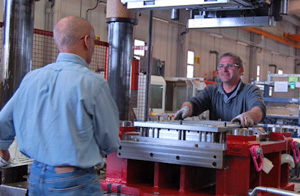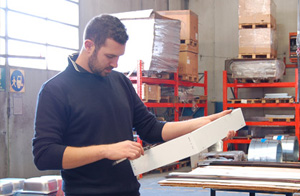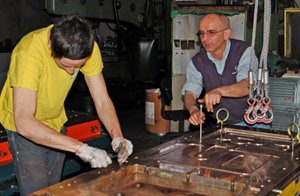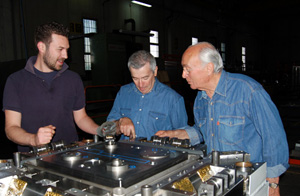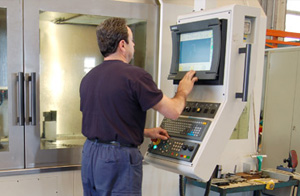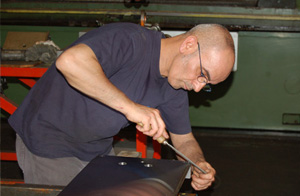Frequently Asked Questions
This is a short list of frequently asked questions.
Should you have a question that is not addressed here, please contact us directly.
If you would like to request us for a proposal/quotation, please contact us at tech@frigeri.com and include as much information about your company and part/process as possible.
Will buying tool and dies from you make me save my money?
Will buying tool and dies from you make me save my money?
In the perspective of a fine investment, we always advise and encourage our Clients to take as the main purchasing driver the Total Cost of Ownership, i.e. the whole of purchasing costs, management costs, maintenance costs, costs of delayed shipments, costs of delayed production startup, costs of tool defects and downtime, costs of non-conforming parts, costs of further tool re-engineering, reworking, repair, extraordinary maintenance, etc.
Some companies delude themselves into thinking that they are saving, let’s say, 50% by buying in low-cost countries, but forgetting to account the cost and time they incur every time they have to face and fix production issues.
When buying complex and high value-added mechanical prototypes like tools and dies, to really save your money try instead to think in terms of technology to price to value ratio, that is in terms of doing a fine investment in the short and medium term perspective, rather than restrict yourself to thinking in terms of unconditioned money saving in the “now” term.
Well, when you read such astonishing claims, you can’t help but think:”Wow! We have found Toolmaking’s Heaven!” and feel yourself furiously impelled to go straight ahead and buy tools and dies from these otherworldly companies, imploring them to instantly sign your contract and go ahead with the Heavenly Tool production.
We are sorry, but in our real word things are a bit different and far more complicated.
From a logical point of view, if what these companies are claiming were true, they would be now the only survived toolmaking companies on earth and all the others would have been swept away years ago. We and a lot of other excellent toolmaking companies around the world, from decades engaged in designing and manufacturing top class level tool and dies, are a living proof of the contrary. That’s all.
From a factual point of view, Conformity (not Quality, that is an improper term, whose use and right of use only pertains to the Client, never to the vendor), Cost and Delivery are all together, not company properties, but highly variable properties dynamically linked to the technological instances of the tool and dies, that is to say that these properties don’t pre-exist a given project at a given date in a given project development environment. Being project-related properties, they live not inside, but outside the company, so that any claim about them, regardless of fine and punctual evaluation of a given project, cannot be other than a bait for fools.
The We-Make-All-Type-Of-Dies is undoubtedly an exterminated army, able to ever recruit new soldiers worldwide. Unfortunately, they go to war with water weapons.
Reading such a nice claim, every time we can’t help but think that a guy with a business card reading”Specialist In Everything” is a bit mad.
Try to think of the incredibly wide range of tool and die appliances: from the 3 to 5 millimeters micro-chip to the 3.000 to 5.000 and more millimeters of an automotive body panel or an industrial vehicle, passing through an infinite number of appliances and industries: automotive, household appliances, heating and conditioning, lighting, agricultural appliances, biotech&pharma, medical, foods, construction, computers and computer components, electronics, sports and free-time, aerospace, oil and gas, energy and electricity, raw materials, telecommunications, health care, consumer goods, manufacturing, etc., etc., etc.: an infinite list. So, do you really think it is possible for a single toolmaking company to have developed over the (terrestrial) years all the incommensurable skills, core-competence and technological assets to master the infinite production needs and requirements of infinite industries? Surely not, and we think like you.
Simply, such a stupid and illogical claim requires to be interpreted as an equation:
We-Make-All-Type-Of-Dies = We-Make-Nothing
About us. While we developed over more than four decades of market presence a lot of tools and dies for a number of industries, we specialized in designing and manufacturing first-in-class tools and dies for four main industries appliances: household (home) appliances, heating and conditioning, lighting and automotive, for the latter mainly frame parts. This is not a claim, this is a fact. Visit our Products & Services page or ask us for further information.
So, what’s your advice for buying tool and dies?
So, what’s your advice for buying tool and dies?
Three golden rules in buying tool and dies.
First rule: ask always the toolmaking company under your focus what type of appliances it is specialized for and ask them to give you proof of it (references, number and morphology of parts produced for a particular sub-appliance (for example: brackets for automotive or cooking hobs for household appliances), technologies involved, related case studies and so on). Never buy without a persuasive and proving reply based on evidence. Ignore mere claims and demand facts, only facts.
Second rule: never give a second chance to a toolmaker that failed the first one.
Third rule: never buy from a toolmaker so silly as to promote himself by making unfounded and false claims: the risk for you, in buying on the base of silly claims, is wasting your money with buying silly dies.
What countries have you had trade relations with?
What countries have you had trade relations with?
Italy, Belarus, China, France, Germany, Poland, Portugal, Romania, Russian Federation, Spain, Sweden, Switzerland, Turkey, UK. Besides, we have ongoing commercial relations with Brazil, Chile, Egypt, Iran, USA and we are always open to starting relationships with new countries.
Since dies are complex prototypes often characterized by quite sophisticated design configurations, not always correctly manageable by merely following assembly drawings or instructions, until today we preferred taking care ourselves of our products, wherever they will be producing and whenever they will need some further or renewed or closer attention. Nonetheless, we are open to evaluate proposal of partnerships coming from local and valued toolmakers to start relationships for the localized maintenance of our tool and dies around the world.
Who are your Clients? What type of tools did you supply them?
Who are your Clients? What type of tools did you supply them?
Here you can find a list of our main Clients. Here you can find a list of stamped parts produced by operating tool and dies we designed and manufactured. Please note that both lists are incomplete. Feel free to contact us for any further information.
What is your Clients’ loyalty rate?
What is your Clients’ loyalty rate?
We have about 70% of loyal Clients and we feel ourselves every day highly honoured to be considered worthy of their loyalty and deeply committed to continuing to be so. Interesting to note, inside the remaining 30%, about 16% are returning Clients.
How does Frigeri protect Intellectual Property (IP) for its Clients?
How does Frigeri protect Intellectual Property (IP) for its Clients?
A basic step in IP protection is to sign a Non Disclosure Agreement (NDA). We sign NDA’s with nearly all our Clients and always require to all our subcontractors to sign one with us as well. At the same time, we expect that all the Clients and Partners protect and respect, as we do with theirs, our own rights and needs in the matter of Intellectual Property.
So, is it possible to sign a Non Disclosure Agreement with Frigeri?
So, is it possible to sign a Non Disclosure Agreement with Frigeri?
Yes, absolutely. Protection of the confidentiality of your project is a must also for us. With nearly all our Clients we sign a Non Disclosure Agreement (otherwise called Confidentiality Agreement) prior to receiving any confidential information.
How can we get a quotation from Frigeri?
How can we get a quotation from Frigeri?
E-mail us at tech@frigeri.com your part drawings and include as much information about your company and your part/process as possible. We will contact you within two business days to go ahead with a quotation.
What type of drawing formats do I need to send for a quotation?
What type of drawing formats do I need to send for a quotation?
Any type of drawing is fine for quotation purposes. If required, our Engineering Department will ask you for some further or alternative format and information.
What type of format do you support for CAD data exchange?
What type of format do you support for CAD data exchange?
In addition to neutral CAD formats, like STEP, IGES, DXF and DWG, we can manage, upon request, direct and bidirectional translations with the most popular proprietary CAD formats, like CATIA, PROE, UNIGRAPHICS, SOLID WORKS, SOLID EDGE, AUTODESK INVENTOR.
How many dies do you design and manufacture per year?
How many dies do you design and manufacture per year?
Using a quite rough classification of the dies, according to their overall production instances/needs and the related design and manufacturing man-hours required for production (top-tech dies: 1.500+ man-hours/die; high-tech dies: 1.000 to 1.500 man-hours/die; medium-tech dies: 500 to 1.000 man-hours/die; low-tech dies: 250-500 man-hours/die; no-tech dies: less than 250 man-hours/die. NOTE. Every value to be intended with a grey zone of +/- 250 man-hours) and knowing the value of our total production capacity per year (see answer to question: What is your man-hour production capacity per year?) you can easily calculate our actual specific production capacity. Please note that the values above have to be strictly referred to the typical production efficiency rates of the high-industrialized countries (Europe, USA, Japan).
What is your delivery time success rate?
What is your delivery time success rate?
About 89%, that rises to 92% and 94% for deliveries that fall respectively one week and two weeks beyond the contractual deadline. It is to be noted that deliveries exceeding the above terms are often conditioned by factors, facts and events that are far beyond our company control.
What is your response time for on site and in-house maintenance operations?
What is your response time for on site and in-house maintenance operations?
Our response time is immediate on telephone or e-mail calls, regardless the criticality of the tool event.
In case of critical faults and failures that requires us to operate directly at the Client’s site, our response time is 24/48 hours for Europe, 48 hours for Middle East and North Africa, 72/96 hours for the rest of the world.
Aside from this, a couple factors have to be considered. Firstly, our tool and dies are designed and manufactured so as to require a very minimum of maintenance and give you a long and safe production life on the sole condition that your production department take care of the tools through ordinary and regular maintenance. Secondly, we encourage our Clients to plan and follow an accurate tool preventative maintenance program so as to reduce from the very minimum to zero the main failure risks. According to our experience, up to 75% of tool and die in-process failures/faults have to be related to a lack of care or rough omissions in performing tool periodic controls/checks and in following a regular preventative maintenance program.
What is your man-hour production capacity per year?
What is your man-hour production capacity per year?
Our total capacity (year 2010) is about 65.000 man-hours per year.
We can also count on an extended capacity (year 2010) of 14.000-18.000 man-hours per year.
We plan to expand our production capacity to ~100.000 man-hours per year by 2013.
What percentage, if any, of your tool production are you outsourcing?
What percentage, if any, of your tool production are you outsourcing?
Our production outsourcing is about 30% (year 2010) and it is limited to special machinings. We chose to keep eye-controlled all key-processes implicated in manufacturing our tools and dies.
What percentage, if any, of your tool design are you outsourcing?
What percentage, if any, of your tool design are you outsourcing?
Our tool design processes are all insourced. Occasionally, we outsources low value design activities, like mere drawing or technical document drafting. High value design activities, like stamping simulation, concept design, stamping process planning, tool configuration, assembly drawings, etc. are never outsourced.
What is the average age and educational skills of your employees?
What is the average age and educational skills of your employees?
The average age of our employees is 35 (year 2010).
Company overall educational skills (year 2010) are the following: Degree 24%; Diploma 30%; Secondary school with vocational qualification 30%; Secondary school 16%.
What type of investments are you currently making and in which direction?
What type of investments are you currently making and in which direction?
In addition to SPEED, our main R&D project (see here and here to know more about SPEED), we are investing in stamping raw materials advanced testing methods, equipment and machines, as a way to improve, enhance and refine up to “zero approximation” our prediction capacity in the stamping simulation process. We want to build a perfect tool before the first machining swarf falls on the production floor.
What are your strengths and what your weaknesses?
What are your strengths and what your weaknesses?
Our key strengths are undoubtedly the extraordinary core-competence and vertical skills in tooling for household appliances, the full mastery of simulated technologies applied to stamping science and the absolute competitiveness of our technology to price to value ratio, that make us remarkably competitive in low to medium-tech and exceptionally competitive in high to top-tech tool&dies business.
Our main weakness is our absolute honesty and integrity, that in today’s world, sometimes, can’t help but seriously disadvantage our company and interfere with our market action.


